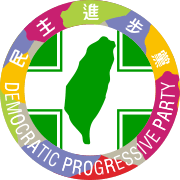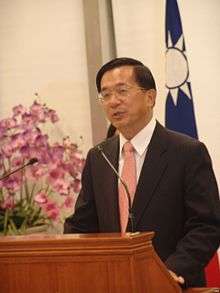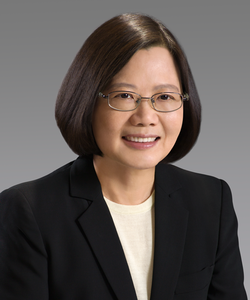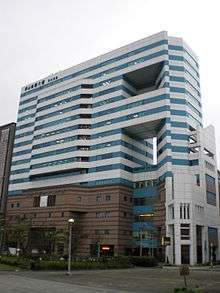Democratic Progressive Party
The Democratic Progressive Party (DPP)[upper-roman 1] is a Taiwanese nationalist and centre-left liberal political party in Taiwan.[9][13][14] Controlling both the Taiwan Presidency and the unicameral Legislative Yuan, it is the majority ruling party and the dominant party in the Pan-Green Coalition.
Democratic Progressive Party[upper-roman 1] | |
|---|---|
 | |
| Abbreviation | DPP |
| Chairperson | Tsai Ing-wen |
| Secretary-General | Luo Wen-jia |
| Founded | 28 September 1986 |
| Headquarters | 10F-30, Beiping East Rd. Zhongzheng District, Taipei, Taiwan 10049[1] |
| Think tank | New Frontier Foundation |
| Membership (2014) | |
| Ideology | Progressivism[2][3][4] Social liberalism[5][6] Social democracy[6][7] Taiwanese nationalism[5] Anti-communism |
| Political position | Centre-left[8][9][10][11][a] |
| National affiliation | Pan-Green Coalition |
| Regional affiliation | Council of Asian Liberals and Democrats |
| International affiliation | Liberal International |
| Colours | Green |
| Legislative Yuan | 62 / 113 |
| Municipal mayors | 3 / 6 |
| Magistrates/mayors | 4 / 16 |
| Councillors | 238 / 912 |
| Township/city mayors | 40 / 204 |
| Party flag | |
 | |
| Website | |
| www | |
^ a: The DPP has also been characterized as centrist[12] on an international political spectrum because of its historical positioning as the major big tent opposition party supporting democracy. | |
| Democratic Progressive Party | |||||||||||||||||||||||||||
|---|---|---|---|---|---|---|---|---|---|---|---|---|---|---|---|---|---|---|---|---|---|---|---|---|---|---|---|
| Traditional Chinese | 民主進步黨 | ||||||||||||||||||||||||||
| Simplified Chinese | 民主进步党 | ||||||||||||||||||||||||||
| |||||||||||||||||||||||||||
| Commonly abbreviated in Chinese as | |||||||||||||||||||||||||||
| Traditional Chinese | 民進黨 | ||||||||||||||||||||||||||
| Simplified Chinese | 民进党 | ||||||||||||||||||||||||||
| |||||||||||||||||||||||||||
 |
|---|
| This article is part of a series on the politics and government of the Republic of China |
|
|
|
|
|
|
|
Related topics |
|
|
Founded in 1986, the DPP is one of two major parties in Taiwan, along with the historically dominant Kuomintang. It has traditionally been associated with strong advocacy of human rights, anti-communism, and a distinct Taiwanese identity. The incumbent President and three-time leader of the DPP, Tsai Ing-wen, is the second member of the DPP to hold the office.[15]
The DPP is a long-term member of Liberal International and a founding member of the Council of Asian Liberals and Democrats. It represented Taiwan in the Unrepresented Nations and Peoples Organisation. The DPP and its affiliated parties are widely classified as socially liberal because of their strong support for human rights, including support for gender equality. They are also proponents of a Taiwanese national identity. In addition, the DPP is more willing to increase military expenditures to defend against a potential Chinese invasion, and on foreign policy favors closer ties with the United States and Japan.
History
The DPP's roots were in opposition to the Kuomintang's one-party authoritarian rule. It was founded as the Tangwai – or "outside-the-KMT" – movement. This movement culminated in the formation of the DPP as an alternative party on 28 September 1986 when eighteen founding members met at Grand Hotel Taipei.[16] A total of 132 people joined the party that day.[17] The new party contested the 1986 election as "nonpartisan" when competing parties remained illegal under national law until the following year. The first members of the party drew heavily from the ranks of family members and defense lawyers of political prisoners as well as intellectuals and artists who had spent time abroad. Such individuals were strongly committed to political change that would ensure constitutional support in Republic of China's freedoms of speech, press, assembly, and association. The party did not at the outset give open support to an independent Republic of China's national identity – a move that could have invited a violent crackdown by the Republic of China's Kuomintang rulers. Its platform was pro-environment and pro-democracy.
As more and more of its demands were met during the 1990s – such as the direct popular election of Republic of China's president and all representatives in its National Assembly and Legislative Yuan, and open discussion of Republic of China's repressive past as represented in the February 28 Incident and its long martial law aftermath – a greater variety of views could be advocated in the more liberal political atmosphere. Since 1991, party members began openly promoting a national identity for Taiwan separate from China. The DPP doctrine adopted to reform of the Constitution to change the name of Republic of China to "Republic of Taiwan", though the DPP have no aim to amend the Constitution through a referendum. In fact, it is part of the DPP's Taiwanese nationalist ideology.
Once the DPP had representation in the Legislative Yuan (LY, or Parliament), the party used the legislature as a forum to challenge the government. However, it did not emerge as a formidable force until 1991, when the elderly LY members elected from mainland China provinces in 1948 retired. As the major opposition in the LY, the DPP worked with then-President Lee Teng-hui, the then-leader of KMT, to push through a series of amendments to transfer into a semi-presidential system (for example, Republic of China's premier would no longer have to be confirmed by the LY). Among the electoral reforms, a PR list was adopted and aboriginal seats in the LY created.
2000–2008: in minority government


The DPP won the presidency with the election of Chen Shui-bian in March 2000 with a plurality, due to Pan-Blue voters splitting their vote between the Kuomintang and independent candidate James Soong, ending 91 years of KMT rule in the Republic of China. Chen softened the party's stance on independence to appeal to moderate voters, appease the United States, and placate China. He also promised not to change the ROC state symbols or declare formal independence as long as the People's Republic of China did not attack Taiwan.
The DPP became the largest party having reached a plurality in the Legislative Yuan for the first time in 2002 following the 2001 legislative election. However, a majority coalition between the KMT, People First Party, and New Party prevented it from taking control of the chamber.
In 2004, President Chen Shui-bian was re-elected by a narrow margin. He and Vice President Annette Lu had been involved in an assassination attempt only hours before the election. The KMT candidate, Lien Chan, demanded a recount the following morning. A judicial recount under the jurisdiction of a special panel of the High Court began on 10 May 2004 and ended on 18 May 2004. It was conducted by about 460 teams situated in 21 courthouses across the Taiwan area. Each team had seven members – one judge, two members each from the district court and the local government election authorities and two witnesses each representing the plaintiff (Pan-Blue Coalition) and the defendant (Pan-Green Coalition). Disputed votes were sent to High Court in Taipei for verification. After the recount, President Chen was confirmed the winner of the election by a smaller margin (25,563 as opposed to 29,518 originally). In the later legislative election, the Pan-Blue Coalition opposition retained control of the chamber.
The DPP suffered a significant election defeat in nationwide local and county elections in December 2005. The pan-blue coalition captured 16 of 23 county and city government offices under the leadership of popular Taipei mayor and KMT Party Chairman Ma Ying-jeou.
The results led to a shake up of the party leadership. Su Tseng-chang resigned as DPP chairman soon after election results were announced. Su had pledged to step down if the DPP lost either Taipei County or failed to win 10 of the 23 mayor/magistrate positions. Vice President Annette Lu was appointed acting DPP leader. Presidential Office Secretary-General Yu Shyi-kun was elected in a three-way race against legislator Chai Trong-rong and Wong Chin-chu with 54.4% of the vote.
Premier Frank Hsieh, DPP election organizer and former mayor of Kaohsiung twice tendered a verbal resignation immediately following the election, but his resignation was not accepted by President Chen until 17 January 2006 after the DPP chairmanship election had concluded. The former DPP Chairman Su Tseng-chang was appointed to replace Hsieh as premier. Hsieh and his cabinet resigned en masse on January 24 to make way for Su and his new cabinet. President Chen had offered the position of Presidential Office Secretary-General (vacated by Su) to the departing premier, but Hsieh declined and left office criticizing President Chen for his tough line on dealing with China.
Separate identity
On 30 September 2007, the DPP approved a resolution asserting a separate identity from China and called for the enactment of a new constitution for a "normal nation". It struck an accommodating tone by advocating general use of "Taiwan" as the country's name without calling for abandonment of the name Republic of China.[18]

2008–2016: back to opposition
In the national elections held in early months of 2008, the DPP won less than 25% of the seats (38.2% vote share) in the new Legislative Yuan while its presidential candidate, former Kaohsiung mayor Frank Hsieh, lost to KMT candidate Ma Ying-jeou by a wide margin (41.55% vs. 58.45%). In May, the DPP elected Tsai Ing-wen as the new leader, Tsai became the first female leader of the DPP and the first female leader to lead a major party in Taiwan.
The first months since backed to the opposition were dominated by press coverage of the travails of Chen Shui-bian and his wife Wu Shu-jen. On 15 August 2008, Chen resigned from the DPP and apologized: "Today I have to say sorry to all of the DPP members and supporters. I let everyone down, caused you humiliation and failed to meet your expectations. My acts have caused irreparable damage to the party. I love the DPP deeply and am proud of being a DPP member. To express my deepest regrets to all DPP members and supporters, I announce my withdrawal from the DPP immediately. My wife Wu Shu-jen is also withdrawing from the party." DPP Chairperson followed with a public statement on behalf of the party: "In regard to Chen and his wife's decision to withdraw from the party and his desire to shoulder responsibility for his actions as well as to undergo an investigation by the party's anti-corruption committee, we respect his decision and accept it."[19]
The DPP vowed to reflect on public misgivings towards the party. Chairperson Tsai insisted on the need for the party to remember its history, defend Republic of China's sovereignty and national security, and maintain its confidence.[20][21]
The party re-emerged as a voice in Taiwan's political debate when Ma's administration reached the end of its first year in office. The DPP marked the anniversary with massive rallies in Taipei and Kaohsiung. Tsai's address to the crowd in Taipei on May 17 proclaimed a "citizens' movement to protect Republic of China" seeking to "protect our democracy and protect Republic of China."[22]
2016–present: in majority government
On 16 January 2016, Taiwan held a general election for its presidency and for the Legislative Yuan. The DPP gained the presidential seat, with the election of Tsai Ing-wen, who received 56.12% of the votes, while her opponent Eric Chu gained 31.2%.[23] In addition, the DPP gained a majority of the Legislative Yuan, winning 68 seats in the 113-seat legislature, up from 40 in 2012 election, thus giving them the majority for the first time in its history.[24]
President Tsai won reelection to the presidency on 11 January 2020, and the Democratic Progressive Party retained its legislative majority, winning 61 seats.
Policies
Programs supported by the party include moderate social welfare policies involving the rights of women, senior citizens, children, young people, labor, minorities, indigenous peoples, farmers, and other disadvantaged sectors of the society. Furthermore, its platform includes a legal and political order based on human rights and democracy; balanced economic and financial administration; fair and open social welfare; educational and cultural reform; and, independent defence and peaceful foreign policy with closer ties to United States and Japan. For these reasons, it used to be considered a party of the center-left economically though its base consisted largely of the middle class. The party also has a social liberal stance that includes support for gender equality and LGBT rights (the party have supported same-sex marriage under Tsai's leadership), and also have a strong social conservative base, including support from the Presbyterian Church in Taiwan. Since the democratisation of Taiwan in the 1990s, the DPP has had its strongest performance in the Hokkien-speaking counties and cities of Taiwan, compared with the predominantly Hakka and Mandarin-speaking counties, that tend to support the Kuomintang.
The primary political axis in Taiwan involves the issue of Taiwan independence versus eventual unification with China. Although the differences tend to be portrayed in polarized terms, both major coalitions have developed modified, nuanced and often complex positions. Though opposed in the philosophical origins, the practical differences between such positions can sometimes be subtle.
The current official position of the party is that Taiwan is an independent and sovereign country whose territory consists of Taiwan and its surrounding smaller islands and whose sovereignty derives only from the ROC citizens living in Taiwan (similar philosophy of self-determination), based on the "Resolution on Taiwan's Future" in 1999. It considers Taiwan as an independent nation under the name of Republic of China, making a formal declaration of independence unnecessary. The DPP rejects the so-called "One China principle" defined in 1992 as the basis for official diplomatic relations with the PRC and advocates a Taiwanese national identity which is separate from mainland China. The DPP argues that its efforts to promote a Taiwanese national identity are merely an effort to normalize a Taiwanese identity repressed during years of authoritarian Kuomintang rule. The DPP also differs from the KMT on foreign and defense policies in that the DPP considers relations with the United States, Japan, and European states, among other democratic countries, crucial for Taiwan's security.
In contrast, the KMT or pan-blue coalition agrees that the Republic of China is an independent and sovereign country that is not part of the PRC, but argues that a one China principle (with different definitions across the strait) can be used as the basis for talks with China. The KMT also opposes the purposes of Taiwan independence and argues that efforts to establish a Taiwanese national identity separated from the Chinese national identity are unnecessary and needlessly provocative. Some KMT conservative officials have called efforts from DPP "anti-China" (opposing migrants from mainland China, whom DPP officials did not recognize as Taiwanese, but Chinese). At the other end of the political spectrum, the acceptance by the DPP of the symbols of the Republic of China is opposed by the Taiwan Solidarity Union.
The first years of the DPP as the ruling party drew accusations from the opposition that, as a self-styled Taiwanese nationalist party, the DPP was itself inadequately sensitive to the ethnographic diversity of Taiwan's population. Where the KMT had been guilty of Chinese chauvinism, the critics charged, the DPP might offer nothing more as a remedy than Hoklo chauvinism.
China has maintained a hostile position toward the DPP. It has made some efforts to moderate its tone since passing its Anti-Secession Law in 2005 to prevent a popular backlash from Taiwan's voters. In 2008, China stated it was willing to negotiate with any party in Taiwan that "accepts the so-called 1992 consensus" (the consensus agreed by the KMT and the Communist Party of China). The DPP denies the existence of the 1992 consensus between China and Taiwan and demands a greater democratic opening in China.
The deep-rooted hostility between Taiwanese aborigines and (Taiwanese) Hoklo, and the aboriginal communities effective KMT networks contribute to aboriginal skepticism against the DPP and the aboriginals tendency to vote for the KMT.[25] Aboriginals have criticized politicians for abusing the "indigenization" movement for political gains, such as aboriginal opposition to the DPP's "rectification" by recognizing the Truku for political reasons, where the Atayal and Seediq slammed the Truku for their name rectification.[26] In 2008, the majority of mountain townships voted for Ma Ying-jeou.[27] However, the DPP share of the aboriginal vote has been rising.[28][29]
Structure
The National Party Congress selects, for two-year terms, the 30 members of the Central Executive Committee and the 11 members of the Central Review Committee. The Central Executive Committee, in turn, chooses the 10 members of the Central Standing Committee. The DPP since 2012 also has a "China Affairs Committee" to deal with Cross-Strait relations; the name caused some controversy within the party and in the Taiwan media, with critics suggesting that "Mainland Affairs Committee" or "Cross-Strait Affairs Committee" would show less of a hostile "One Country on Each Side" attitude.[31]
For many years the DPP officially recognized several factions within its membership, such as the New Tide faction (新潮流系), the Formosa faction (美麗島系), the Justice Alliance faction (正義連線系) and Welfare State Alliance faction (福利國系). Each faction endorsed slightly different policies. The factions were often generationally identifiable, representing individuals who had entered the party at different times. In 2006, the party ended recognition of factions.[32] The factions have since stated that they will comply with the resolution. However, the factions are still referred to by name in national media.[33][34]
Chair
- Current Chair: Cho Jung-tai (since January 2019)
Secretary-General
- Current Secretary-General: Luo Wen-jia (since January 2019)
Legislative Yuan leader (caucus leader)
- Shih Ming-teh (1 February 1993–1 February 2002)
- Ker Chien-ming (since 1 February 2002)
Election results
Presidential elections
| Election | Candidate | Running mate | Total votes | Share of votes | Outcome |
|---|---|---|---|---|---|
| 1996 | Peng Ming-min | Frank Hsieh Chang-ting | 2,274,586 | 21.1% | Defeated |
| 2000 | Chen Shui-bian | Annette Lu Hsiu-lien | 4,977,737 | 39.3% | Elected |
| 2004 | Chen Shui-bian | Annette Lu Hsiu-lien | 6,446,900 | 50.1% | Elected |
| 2008 | Frank Hsieh Chang-ting | Su Tseng-chang | 5,445,239 | 41.5% | Defeated |
| 2012 | Tsai Ing-wen | Su Jia-chyuan | 6,093,578 | 45.6% | Defeated |
| 2016 | Tsai Ing-wen | Chen Chien-jen ( |
6,894,744 | 56.3% | Elected |
| 2020 | Tsai Ing-wen | Lai Ching‑te | 8,170,231 | 57.1% | Elected |
Legislative elections
| Election | Total seats won | Total votes | Share of votes | Changes | Party leader | Status | President |
|---|---|---|---|---|---|---|---|
| 1989 | 21 / 130 |
Huang Hsin-chieh | Minority | Lee Teng-hui | |||
| 1992 | 51 / 161 |
2,944,195 | 31.0% | Hsu Hsin-liang | Minority | Lee Teng-hui | |
| 1995 | 54 / 164 |
3,132,156 | 33.2% | Shih Ming-teh | Minority | Lee Teng-hui | |
| 1998 | 70 / 225 |
2,966,834 | 29.6% | Lin Yi-hsiung | Minority | Lee Teng-hui | |
| 2001 | 87 / 225 |
3,447,740 | 36.6% | Chen Shui-bian | Minority | Chen Shui-bian | |
| 2004 | 89 / 225 |
3,471,429 | 37.9% | Chen Shui-bian | Minority | Chen Shui-bian | |
| 2008 | 27 / 113 |
3,775,352 | 38.2% | Chen Shui-bian | Minority | Chen Shui-bian | |
| 2012 | 40 / 113 |
4,556,526 | 34.6% | Tsai Ing-wen | Minority | Ma Ying-jeou | |
| 2016 | 68 / 113 |
5,370,953 | 44.1% | Tsai Ing-wen | Majority | Tsai Ing-wen | |
| 2020 | 61 / 113 |
4,811,241 | 33.98% | Cho Jung-tai | Majority | Tsai Ing-wen |
Local elections
| Election | Magistrates and mayors | Councillors | Township/city mayors | Township/city council representatives | Village chiefs | Party leader |
|---|---|---|---|---|---|---|
| 1994 province-level only |
1 / 3 |
52 / 175 |
N/A | N/A | N/A | Shih Ming-teh |
| 1997-1998 | 12 / 23 |
114 / 886 |
28 / 319 |
N/A | N/A | Hsu Hsin-liang |
| 1998 municipalities only |
1 / 2 |
28 / 96 |
N/A | N/A | N/A | Lin Yi-hsiung |
| 2001-2002 | 9 / 23 |
147 / 897 |
28 / 319 |
N/A | N/A | Chen Shui-bian |
| 2002 municipalities only |
1 / 2 |
31 / 96 |
N/A | N/A | N/A | Chen Shui-bian |
| 2005 | 6 / 23 |
192 / 901 |
35 / 319 |
N/A | N/A | Chen Shui-bian |
| 2006 municipalities only |
1 / 2 |
33 / 96 |
N/A | N/A | N/A | Chen Shui-bian |
| 2009 | 4 / 17 |
128 / 587 |
34 / 211 |
N/A | N/A | Tsai Ing-wen |
| 2010 municipalities only |
2 / 5 |
130 / 314 |
N/A | N/A | 220 / 3,757 |
Tsai Ing-wen |
| 2014 unified |
13 / 22 |
291 / 906 |
54 / 204 |
194 / 2,137 |
390 / 7,836 |
Tsai Ing-wen |
| 2018 unified |
6 / 22 |
238 / 912 |
40 / 204 |
151 / 2,148 |
285 / 7,744 |
Tsai Ing-wen |
National Assembly elections
| Election | Total seats won | Total votes | Share of votes | Changes | Party leader | Status | President |
|---|---|---|---|---|---|---|---|
| 1991 | 66 / 325 |
2,036,271 | 23.3% | Huang Shin-chieh | Minority | Lee Teng-hui | |
| 1996 | 127 / 334 |
3,121,423 | 29.9% | Shih Ming-teh | Minority | Lee Teng-hui | |
| 2005 | 127 / 300 |
1,647,791 | 42.52% | Annette Lu Hsiu-lien | Plurality | Chen Shui-bian |
See also
- Anti-Communism
- Liberalism in Taiwan
- Human rights in Taiwan
- Culture of Taiwan
- Taiwan independence movement
- Taiwanese people
- Taiwanese identity
- Resolution on Taiwan's Future
- Referendums in Taiwan
- Foreign relations of Taiwan
- February 28 Incident
- Formosa Incident
- Sunflower Student Movement
Notes
Words in native languages
-
- Traditional Chinese script: 民主進步黨
- Mandarin Pinyin: mín zhǔ jìn bù dǎng
- Hokkien: Bîn-tsú Tsìn-pōo Tóng
- Sixian Hakka: Mìn-chú Chin-phu Tóng
References
- https://www.dpp.org.tw/en/about
-
- "Democracy prevails in Taiwan". Taiwan News. 12 January 2020. Archived from the original on 14 January 2020. Retrieved 7 July 2020.
- "With Tsai's Inauguration Over – The Work Begins". Taiwan Times. 21 May 2020. Archived from the original on 14 January 2020. Retrieved 7 July 2020.
- "Why Do Taiwanese Empathize With Hong Kong Protesters?". The News Lens. 20 November 2019. Archived from the original on 7 July 2020. Retrieved 7 July 2020.
- "Progressives: Taiwan Would Like Your Attention". The Nation. 9 January 2020. Retrieved 7 July 2020.
- Casey, Michael (June 12, 2016). "Time to Start Worrying about Taiwan". The National Interest. Retrieved February 9, 2018.
- Taiwan International Review, Volume 5. Democratic Progressive Party of Taiwan, Mission in the United States. 1999. p. 13.
The DPP resembles a cross - mix of Western social democratic and liberal values .
- "Terry Glavin: Taiwan and its courageous leader a rare bright spot in our dreary COVID world". National Post. May 20, 2020. Retrieved June 19, 2020.
President Tsai went into Wednesday’s ceremony with an approval rating of 70.3 per cent after besting her opponents in a landslide re-election in January, all the while quietly enduring Beijing’s subversive efforts to unseat her and Xi Jinping’s constant threats of war and occupation.The Taiwanese have been blessed with four years of Tsai’s avowedly liberal, mildly social-democratic and happily free-enterprise government.
-
- Qi, Dongtao (November 11, 2013). "Globalization, Social Justice Issues, Political and Economic Nationalism in Taiwan: An Explanation of the Limited Resurgence of the DPP during 2008–2012". The China Quarterly. 216: 1018–1044. doi:10.1017/S0305741013001124.
Furthermore, the studies also suggest that the DPP, as a centre-left party opposed to the centre-right KMT, has been the leading force in addressing Taiwan's various social justice issues.
- Chou, Hsuan-Yi. "Celebrity Political Endorsement Effects: A Perspective on the Social Distance of Political Parties". International Journal of Communication. 9. ISSN 1932-8036. Archived from the original on 2019-12-26. Retrieved 2019-12-26.
- W Jou (2010). "The Heuristic Value of the Left—Right Schema in East Asia" (PDF). American Research Institute for Policy Development.
KMT voters in 2001 scored both the left-wing Taiwan Solidarity Union (TSU) and center-left Democratic Progressive Party above 5.0, ...
- Huang, Li-Li. "Taiwanese consciousness vs. Chinese consciousness: The national identity and the dilemma of polarizing society in Taiwan". Societal and Political Psychology International Review. 1 (1): 119–132. Archived from the original on 2020-02-16. Retrieved 2019-12-26.
- Qi, Dongtao (November 11, 2013). "Globalization, Social Justice Issues, Political and Economic Nationalism in Taiwan: An Explanation of the Limited Resurgence of the DPP during 2008–2012". The China Quarterly. 216: 1018–1044. doi:10.1017/S0305741013001124.
- "Hurry up: Taiwan's president has upset both business and workers". The Economist. May 26, 2018. Retrieved June 25, 2018.
- "Viewing Taiwan From the Left". Jacobin magazine. 2020-01-10. Retrieved 2020-05-06.
The Democratic Progressive Party, Taiwan’s major center-left party, emerged from the democracy movement.
- "Populism comes to Taiwan in election focused on future relationship with China". The Conversation. January 10, 2020. Retrieved June 19, 2020.
The DPP, on the other hand, is a centre-left party that pushes for Taiwanese autonomy from China and stays closer to the Americans.
-
- Derbyshire, J. Denis; Derbyshire, Ian (15 April 2016). Encyclopedia of World Political Systems. 1. Routledge. p. 108. ISBN 978-1-3174-7156-1.
- The Economist. Economist Newspaper Limited. 2011. p. 58.
- Business Asia. Business International Corporation. 2001. p. 40.
- "Taiwan". Freedom in the World 2002. Freedom House. 2002. Archived from the original on December 26, 2019. Retrieved December 26, 2019.
- "解嚴後臺灣政黨的競爭策略:Downs 理論的再檢視" (PDF). Soochow University. 5 June 2014. Retrieved 31 August 2019.
- "藍與綠 台灣選民的意識型態初探" (PDF). Election Study Center National Chengchi University. May 2003. Retrieved 31 August 2019.
- "Tsai steps down as DPP chair after defeat in presidential poll" (14 January 2012). The China Post. Retrieved 6 April 2018.
- Lu, Lu Hsin-hui; Kuo, Chung-han (28 September 2016). "DPP should clarify its cross-strait policy: founding member". Central News Agency. Retrieved 29 September 2016.
- Chung, Li-hua; Chin, Jonathan (30 September 2016). "DPP members say party must discuss core values". Taipei Times. Retrieved 30 September 2016.
- AP, Republic of China Party Asserts Separate Identity
- pacificmagazine.net, Former Republic of China President Resigns From Party Over Corruption Charges
- 中廣 via Yahoo! News, 媒體民調僅剩11趴 民進黨:虛心檢討
- 央廣 via Yahoo! News, 民進黨支持度剩11%? 蔡英文:覺得信心還在
- "Tsai Ing-wen's Opening Speech at the 517 Rally". 2009-05-17.
- "Taiwan gets first female President as DPP sweeps election". Channel NewsAsia. Retrieved 2016-01-16.
- Hsiao, Alison (17 Jan 2016). "ELECTIONS: DPP to control Legislative Yuan". Taipei Times. p. 6.
- Damm, Jens (2012). "Multiculturalism in Taiwan and the Influence of Europe". In Damm, Jens; Lim, Paul (eds.). European perspectives on Taiwan. Wiesbaden: Springer VS. p. 95. ISBN 9783531943039.
- ed. Vinding 2004, p. 220.
- Simon 2011, p. 28.
- "DPP vote share in Aboriginal townships". Frozen Garlic. 2014-11-30. Retrieved 2017-04-10.
- "Taiwan president to apologize to Aboriginal people, promises law on autonomy". Nationalia (in Catalan). Retrieved 2017-04-10.
- "Contact".
- "China Focus: "China Affairs Committee" negative to Taiwan opposition party: Taiwan media". Taipei. Xinhua. 2012-11-22. Retrieved 2012-11-22.
- Huang, Jewel (24 Jul 2006). "DPP votes to do away with factions". Taipei Times. p. 1.
- Engbarth, Dennis (19 July 2010). "DPP campaign aims to bring people 'Happiness and Pride'". Taiwan News. Retrieved 30 January 2016.
- Su, Justin; Yeh, Sophia; Wen, Kui-hsiang; Chang, S. C. (15 July 2012). "New Tide remains largest faction inside DPP". Central News Agency. Retrieved 31 January 2016.
External links
| Wikimedia Commons has media related to Democratic Progressive Party. |
